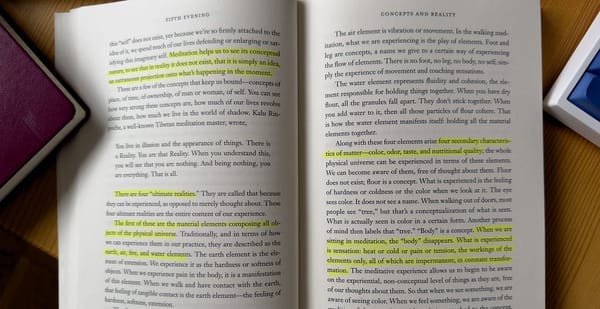Mastering The Art of Saying “No”
I’m going to investigate the reasons why people are uncomfortable saying ‘No’, often to their own detriment.

“Ask you mother”, “Ask your father”, “Maybe”, “we’ll see”, “I’m not saying No… but…”
Why is it that in modern life the simple act of refusing a request is something that some of us have trouble with? In this blog I’m going to investigate the reasons why people are uncomfortable saying ‘No’, often to their own detriment. I’ll look at the psychological phenomenon of people pleasing and finish up with some practical tips for setting boundaries and building confidence, because sometimes you just have to say No.

The Science behind Willpower
There are many different blogs, books and videos online that peddle the concept of ‘mindset’. And they all have varying levels of, well, let’s just say ‘Helpfulness’. I think that when it comes to mindset, it is so broadly defined, that any fitness influencer or life coach will be able to twist it to convince you to purchase a course or an overpriced PDF. But the truth is that mindset is just another word for willpower. Now, willpower doesn’t sound as modern, or as sexy - but willpower is one of the superhuman strengths that we all have. It could be something small like taking the stairs instead of the elevator - or something significant, like having the willpower to quit smoking cigarettes. My point is that our mental wellbeing, our mental heath is strongly linked to our strength of mind - call it mindset, call it willpower - it’s the power to make a decision and stick with it and not be swayed. And this is where The Art of Saying ‘No’ is so important, because when you have to say ‘No’, when you have to refuse a request - it is the demonstration that you’re setting boundaries, drawing a line in the sand and exercising your strength of mind.
The strength of saying “No” and its relationship to mindset and self control have been explored over the years in psychology. This includes the following studies:
1. Walter Mischel’s Marshmallow Experiment:
In the late 1960s and early 1970s, psychologist Walter Mischel conducted a series of studies on delayed gratification, known as the Marshmallow Tests. Children were offered a choice between one small reward provided immediately or two small rewards if they waited for a short period. The children who were able to wait longer for the preferred rewards tended to have better life outcomes, such as academic success, health, and social competence, demonstrating the benefits of self-control and ability to say "No" to immediate gratification.
2. Baumeister’s Ego Depletion Theory:
Baumeister's work highlighted that self-control or willpower is like a muscle – it gets exhausted after mental exertion, decreasing the ability to say "No" to subsequent temptations. This research shows that maintaining self-control in one area can reduce the ability to exert self-control in other areas. This study is my absolute favourite as I now have science to back my constant nagging (yes, I’m in my 40s and still act like a child!)
3. Mindset and Willpower Study by Carol Dweck:
Stanford psychologist Carol Dweck conducted a study indicating that people’s beliefs about willpower, whether they see it as a limited or unlimited resource, profoundly impact their self-control and resilience under stress. Those who believed willpower was abundant were better at maintaining self-control than those who viewed it as a finite resource.
I think that what all these studies really indicate is that when it comes to Willpower, Mindset or whatever you want to label it - that this isn’t something we are ‘born’ with, it’s something that we can learn. And just like any skill or muscle, in the case of Baumeister's ego depletion theory, it need to be exercised and built up, but like all muscles - it’s subject to a point of fatigue. Therefore, the next time you’re told that ‘nagging doesn’t work’, just be aware, that it does, you’re just not nagging enough.

Real World Vs. Theory
Psychology studies have often fascinated me from the urban legend of the children growing up with the fear of cotton wool to the dog that starved to death because every time he was fed a bell was rung in his ear. When the bell was taken away, the dog refused to eat. But this isn’t the real world. Performing experiments in controlled environments doesn’t always have the same outcome once your out of the laboratory and a few miles down the road. So, it’s possible to read many different books on mental health and the strength of saying ‘No’, but the real world is far more complex and every situation is different. And I’m going to contradict my own point here, because I genuinely think that it’s important. But sometimes saying Yes, even though you know you shouldn’t, can lead to a really positive outcome - maybe you’re using your own time to complete a task that someone has asked you to do or you’re doing a favour - perhaps a friend is moving house and they need an extra pair of hands, but you’ve hurt your back. The doctor is going to tell you that lifting heavy boxes isn’t going to be good for you, and you know it. However - your friend is desperate and you tell yourself that you’ll be careful. You should say No. In this hypothetical situation you could further injure yourself and end up much worse than you started. And if you’re anything like me, you’ll end up asking for advice on the subreddit r/AmITheArsehole.
In a professional working environment, you may see that a team you work with is grossly understaffed and they need some extra support in meeting a deadline, but you’ve been having relationship problems at home and things are due, in part, to your late nights in the office as the deadlines seems to be heading your way in a Tsunami (feel free to check out my other blogs on productivity and procrastination if this applies to you). In this hypothetical situation, you know that by staying late you’re going to be helping a team that’s already under a lot of pressure, but at the possible expense of another argument once you walk in the door at 10pm (let’s just say you made a promise to be home for dinner and you’re on the verge of breaking it). What is the correct way to handle this situation? It’s a classic Catch 22. I’m a great believer in work to live, not live to work - but I also feel that after many years of working for the same business that my colleagues become an extension of my dysfunctional family. And I often find myself in these situations and I only have myself to blame Why? Well, that’s a great Segway into the next part…

The People Pleaser Phenomenon
According to the website Psychology Today, the characteristics of a people pleaser is that said person is “overly giving” has “low self worth”, “dictated by others” and of course, “rarely says no”. The article in my opinion is overly harsh, but in saying that, I also think that it’s probably right. Though some of the traits that are listed I feel are a bit broad that it may easily fall into ‘courteous’ or dare I say it?, ‘British’.
The people pleaser phenomenon, I think comes from the rise in levels of insecurity, imposter syndrome and the negative effects of social media which has born a generation of people who seek approval and validation from strangers online. In researching this blog, I googled “Is it bad to be a people pleaser” and I was really surprised to see how many pages and advice columns that exist which are giving advice on how to rid yourself of being a people pleaser if you recognise yourself as one. Based on that, I think that there is a good few thousand words that I could write on the subject, because I don’t personally think that being a people pleaser is a negative thing. I think that if a person has deep rooted psychological issues that results in them over compensating in some way shape or form, then perhaps - yes, being a people pleaser is symptom of a deeper problem. If I reflect on my own experiences, I think there have been times where I’ve overcompensated to hide my insecurities - but this has, ironically, only highlighted that I’m an insecure person in some situations. I was recently trapped in a YouTube playlist and, one of my favourite gaming creators, Josh Strife Hayes talked about how people hate silence - and they fill it with noise, but teaching yourself to be comfortable with silence is a sign of confidence. And this got me thinking, because I am guilty as charged when it comes to filling the space of silence with complete and utter crap. And I think we’ve all been guilty of this from time to time. But here’s the clincher - when it comes to insecurity, people pleasing, imposter syndrome and talking utter crap to fill a silence - because you may not be comfortable with your own thoughts (I’ll leave that point there, because I’m not ready to open that can of worms) - taking it back to Baumeister's ego depletion theory, and that the brain is a muscle and a muscle can be trained, that these behaviours can be learned, and they can be unlearned. Of course, those with say, deep rooted psychological issues when it comes to people pleasing may well benefit from some form of professional help - or a very good friend who can call them out for it.
Yes, I know I’ve kind of gotten away from the subject of saying No, but I’m not going to remove that paragraph, because I think it’s important.

Step One to Saying No - Setting Boundaries
Setting boundaries is important, not just in building your own personal willpower, but also because it is the defining of what you are comfortable with, and what you’re not comfortable with. According to author Nedra Glover Taiwan, ‘boundaries are mutual expectations that help you maintain mental and emotional well-being in your relationships’. For example, setting your own personal boundaries is a way to fully appreciate that your chosen partner truly respects you. I am personally a very sociable and outgoing person, but my husband - he’s well, not. And that’s not a bad thing, but there are certain social situations - weddings, birthday parties (any party actually) that he finds uncomfortable and for him, it’s not an environment he wants to be in. This is a boundary of his, that I respect and he respects that I’m the opposite. So I go out, and the next day I often wonder why I can’t be more like him whilst I’m nursing a hangover and feeling sorry for myself.
Boundaries are not just saying ‘No’. In the book ‘Set Boundaries’ the author goes into detail, stating that people in our lives fall into different categories such as family, colleagues and friends.
Take, for example your relationship with your colleagues. The importance of work-life balance cannot be understated. If you’re being asked to exceed your hours consistently or not take the vacation time that you’re contractually owed, then you could be described as the sort of person who is weak at setting boundaries in this area. and this could relate you your insecurities around finding an employer who will respect the importance of a work-life balance. However, if you set boundaries and expectations the first time you’re asked and you make sacrifices to you work-life balance as exception - not the rule, you’ll find that you’re happier at work and you’ll feel like your personal time is respected.
Family is a bit trickier. I’m personally not close to my family, and that’s fine, but this past Christmas I had set some boundaries prior to my visit home and that boundary was disrespected and I found myself in an awkward situation. It was only a couple of days, but it was enough for me to decide to book 10 nights abroad this coming Christmas. Confrontation with family, saying No, for example, can sometimes be fruitless - for me, I chose to remove myself form the situation. It’s a tricky one that.
Friends. Friends should respect your boundaries or they’re not real friends. If you’re open, honest and clear with them - a good friend will respect that. Friends are the family you chose.
As we grow older, and one thing that I’ve become acutely aware of as I’m approaching 43, is that our friendship circle shrinks down, what I have become aware of is that your friends, your true friends can probably be counted on one hand. These people are the ones who know you through and through and respect your boundaries and these are the ones where if you say ‘I can’t’, or ‘Sorry, No’ - then that’s fine, no drama. In the past I’ve had friends that when they’ve been refused something, kick up a massive fuss (I’m sure that now we’re all mature and grown up, they’d act differently) but they would be massively offended, and worse insulted. With little respect of the boundaries or reasons as to why they got told ‘No’ in the first place.
There are so many other types of boundaries we can go into, particularly in the field of relationships, but I’ll keep this point short and sweet. When it comes to sexual boundaries: No, well- it fucking means No.

Step Two - Build Confidence
It can be painfully Slow
I have this saying, now I honestly can’t remember if I came up with this myself or I read it in a book, because I’ve been saying it for over 20 years -
We are all creatures of evolution. Every day, every hour - every second we are changing - as human beings we shed approximately 30,000-40,000 skin cells every minute, which equates to 30-40 million cells in a single day. We are continually being renewed and reborn as our bodies and minds evolve, and this isn’t just biological. Our personalities are also changing. Have you ever looked back at your 18 year old self and considered how different you are? I mean, you’re still you, but you’re different. The experiences that you have had in life are changing you and those changes are so small they’re barely noticeable. I’m not going to quote James Clear, don’t worry.
Tomorrow I will be a slightly different person having completed this blog and published it. I won’t notice the change, but it’s there. And perhaps you may be slightly different from reading it. We are changing! Every. Single. Second.
Why is this important, it’s important because we have the tools in our arsenal to be able to control the changes that we go through, we can steer the ship if we want to. Sometimes it take longer than we think, but we train, learn, persist and when we start saying No to requests that are detrimental to our mental health, or god forbid physical health or financial health - see where I’m going with this? - When we start saying No, we take control of our lives and our self confidence. By setting personal and professional boundaries, it’s not about being rude - it’s about building a sphere around you of things that you are more than comfortable with.

Step Three - Recognising Healthy Relationships
If you’ve fallen into the trap of saying Yes to everything it may be hard to put up the mental guardrails and define your own boundaries. For some mindset is something that needs to be built up and probably won’t happen over night, but as I have already mentioned, we are creatures of evolution and things do take time. However, one of the biggest rewards is that suddenly you may find yourself recognising that the relationships you have with people around you are far more healthy than before.
Years before I met my now husband, I would be out nearly every weekend partying and being overly generous. The bottom line is this - people really did take advantage of my generosity - but equally I was to blame, because I let it happen. Then one day I stopped being as generous and drew a line in the sand, It was really tough for me - but I had to do it. I one by one those people started to leave and lost interest. For my 29th birthday party not a single person turned up. It was a really tough pill to swallow - but I learned a great deal about friendships, loyalty and above all honesty. I was not honest with myself about the quality of those relationships and have I had the strength of mind to say No once in a while, perhaps those relationships would have either become more genuine or ended sooner. It’s odd because I’ve not really thought much about the people who I was close to during those years and I wonder what they are doing these days?
But the relationships that have endured are the ones where I’m clear about my own boundaries. They’ve been set and my mindset is stronger and more focused and surprisingly these aren’t new relationships - they go back to my childhood and they are with the people I went to school with and a few I met in my early 20s. I didn’t need to be a ‘version of myself’ and I think that this is important - and more obvious than ever as I look back through the lens of hindsight. When I was around people where I didn’t have the power of mind to say No, even to my own detriment - I think that I, in part, brought some of that on myself. A hard lesson for sure. But one that I, as an evolving human being have managed to learn from.

Conclusion
Mastering the Art of saying No is a skill that can be learned by anyone.
It comes from our deep internal mindset, and our mental strength is the key to unlocking this superpower. By being able to set your own personal boundaries and erect the necessary guardrails you’ll find that the personal and professional relationships that you develop as you go through life will be much more genuine. And possibly with people who you will take with you through your entire life’s journey. We all make mistakes in how we behave, and if we didn’t, then the journey would be quite boring. So recognise when you make mistakes when it comes to your own ability to stand up for yourself and do what is right for you. Your boss will respect your time, your friends will respect your space and you won’t be finding yourself on reddit asking total strangers ‘Am I the arsehole?’
It’s important to recognise that for some these changes can take a long time, but know that we are always changing and evolving. Our bodies and minds are constantly reinventing itself and for some with psychological issues and mental health problems it may take longer - but with time, practice and patience we can all learn the necessary skills to say “I can’t right now”.
Thank you for reading.



